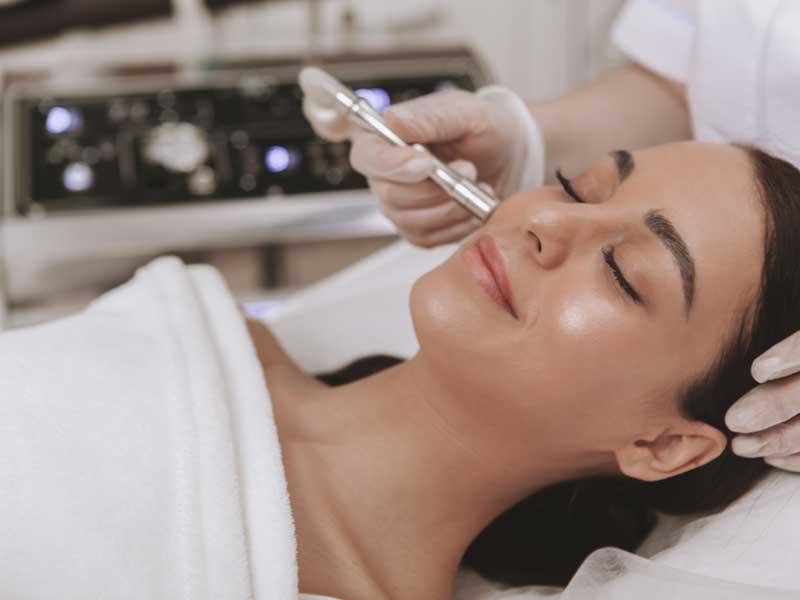Excess melanin production can cause skin spots or darkening of patches of skin than the surrounding skin surface. This type of skin condition is called hyperpigmentation. It can affect individuals irrespective of their skin types. You can consult your skin doctor at an aesthetic clinic JB to medically treat hyperpigmentation. We will discuss various treatment methods for hyperpigmentation in this blog.
Often skin areas that receive excess sun exposure, such as the face, arms, and legs, are prone to develop sunspots. Sometimes, skin inflammation or injuries can also cause this skin condition. Usually, these spots or dark patches are harmless; however, sometimes, they may cause as a result of certain medical conditions.
Melasma is another form of hyperpigmentation that can affect large areas of skin and usually appears on the face. It is pretty common among dark-skinned individuals and mostly affects women. Though doctors are not certain about the exact cause of this type of condition; however, hormonal changes may be responsible for them. Pregnancy or intake of birth control pills can also cause melasma. Similar to other forms of hyperpigmentation, doctors may use various treatment methods to fade or reduce the appearance of this form of skin pigmentation issue.
Causes of Hyperpigmentation
Skin pigmentation issues can be of various types, and so are their causes. The following are some common factors responsible for causing different types of hyperpigmentation.
Sun exposure
Prolonged exposure to the sun can cause the body to produce excess melanin as a form of skin protection. As a result, it can cause dark spots or patches to appear on your skin. They are called sun spots or age spots.
Melasma
As we mentioned earlier, hormonal changes can cause dark patches of skin. Unfortunately, these types of skin conditions are pretty common during pregnancy.
Skin inflammation
Skin inflammation can also cause darkening of the skin. For example, acne, eczema, lupus, or a skin injury can cause skin inflammation. Besides, dark-skinned people are more likely to suffer from skin pigmentation issues.
Reaction to medication
Certain medications, such as antimalarial drugs, antidepressants, chemicals in topical treatments, etc., can cause hyperpigmentation. As a result, some areas of your skin might turn grey.
Medical conditions
Health complications such as hemochromatosis and Addison’s disease can also cause serious forms of skin pigmentation issues.
Hemochromatosis is a genetic condition that can cause patients to hold excess iron in their bodies. It causes the skin to appear tanned or darker. You may experience fatigue, joint pain, weight loss, etc. Doctors might perform different health tests for proper diagnosis.
On the other hand, Addison’s disease affects your adrenal glands and causes pigmentation in lips, elbows and knees, knuckles and toes, and skin fold. Patients may also experience nausea, vomiting, diarrhoea, fatigue, muscle weakness, dizziness, etc. If you experience these symptoms, consult your doctor for a proper diagnosis.
Prevent Hyperpigmentation
If any medical condition is responsible for causing pigmentation, you may not prevent them. However, you can prevent hyperpigmentation by avoiding a few things within your control.
Reduce sun exposure
If it is not entirely possible to avoid sun exposure, you must apply a sunscreen of SPF 30 or higher on your skin for better protection.
Refrain from picking your skin
If you have developed acne, or suffered a skin injury, refrain from picking at them. It can help prevent pigmentation.
Treatment of Hyperpigmentation
If you are suffering from hyperpigmentation, consult your skin specialist in JB. They would medically examine you to determine the causes and types of pigmentation you are suffering from. Then, if required, they might perform a skin biopsy for diagnostics purposes. Once they determine the types of pigmentation, they will provide treatment accordingly.
Chemical Peel
This treatment method involves the application of acids in higher concentrations on the affected area. However, you must not fear this method as the acids are not meant to damage your skin. As each type of chemical peel varies in strength, they use different types of chemical solutions. The various chemical solutions used in this procedure are trichloroacetic acid, salicylic acid, glycolic acid, lactic acid, etc. They help to remove the uppermost layer of the skin epidermis to reduce the appearance of pigmentation. Depending on your skin condition, your doctor at a skin clinic in Johor Bahru may determine to apply a deeper penetration of chemicals to remove the middle skin layer or dermis for more significant results.
If you need to step out in the sun frequently, doctors might not suggest this treatment. The reason is that chemical peels can make your skin sensitive to the sun’s rays. As a result, if you do not apply adequate sunscreen or other skin protection, the sun rays can worsen your pigmentation. Therefore, you need to follow certain precautions for at least a week or, as your doctor advises, after undergoing chemical peel treatment.
Patients with age spots, melasma, and blotchy skin or sun damage might notice improved results from chemical peels.
Pigment Laser (Pico laser or Q switched Nd: Yag laser)
Q switched Nd: YAG laser is the latest technology to treat pigmentation and uneven skin tone. It targets specific pigment or melanin in the skin without damaging the surrounding skin cells. It uses powerful energy to break pigments into smaller particles to make your skin smoother and even out skin tone. Depending on your skin condition, it might take a few sessions to notice significant changes. This treatment is also used for laser tattoo removal.
When treating pigmentation with pigment laser, your skin doctor might also use Pico laser or picoseconds laser. This device uses a short pulse duration to break skin pigmentation and ink particles (tattoos). It further boosts collagen production, making your skin appear brighter and tighter. This treatment is used for pigmentation, acne scars, fine lines and wrinkles, skin brightening, and tattoo removal.
Intense Pulsed Light Therapy (IPL)
Intense Pulsed Light Therapy (IPL), also called photofacial, helps to improve the tone and texture of your skin without the need for any form of surgery. It helps boost collagen growth in your skin’s middle layer or dermis. Your doctor may recommend multiple sessions for better results depending on your skin condition. This treatment procedure helps treat various types of skin pigmentation issues. In addition, it can also help treat wrinkles, enlarged pores, spider veins, etc. It may show significant results for fair-skinned people.
Microdermabrasion
This treatment method is best suited to treat skin pigmentation issues that affect only the upper-most skin layer, i.e. epidermis. In addition, it helps to improve your overall skin tone and texture.
It is a cosmetic procedure where your doctor will use a handheld tool with different types of abrasive attachment, such as a wire brush, etc., as required. They move this tool over your face gently and faster to remove the epidermis. If required, you may need to undergo more than one treatment session for better results. This treatment method also reduces age spots, fine lines, wrinkles, minor scars, etc. In addition, this method can leave your skin looking younger and smoother. Your doctor would examine you thoroughly to determine whether this treatment will be appropriate.
Topical skin brightening and lightening agents
In treating hyperpigmentation, apart from the treatment methods mentioned above, your skin doctor Johor Bahru can prescribe some topical medicine. You may even buy over-the-counter topical skin brightening products. However, while buying these skincare products, you need to check the labels for the ingredients list. Keep the following things in mind while purchasing topical products for hyperpigmentation.
- Many skincare products that claim to reduce hyperpigmentation have hydroquinone or hydrochinone as an active ingredient. It is pretty effective in treating hyperpigmentation. Since it is a skin irritant, it can cause post-inflammatory pigmentation. Hence, before applying any skincare product with this ingredient, you can check whether they are safe to use with your skin doctor.
- It would help if you also looked for products that contain Alpha Hydroxy Acids (AHAs) in the ingredient list. Examples of AHAs are glycolic acid, mulberry extract, and liquorice root extract.
- Besides, products containing ingredients such as azelaic acid, vitamin A (retinol), arbutin, vitamin c, etc., are also pretty effective in reducing pigmentation.
- Azelaic acid can indirectly affect melanin production and reduce skin pigmentation. Howver, it cannot help to treat age spots or freckles.
- Retinoid acid derivatives can reduce pigmentation. However, it can cause skin irritation and increase sensitivity to the sun. It can worsen pigmentation. Hence, you should consult your skin specialist to understand which products should be appropriate for you. Usually, doctors do not prescribe retinoids to pregnant or nursing women.
- Arbutin is a natural source of hydroquinone. Though they might not be as effective as industrially produced hydroquinone, they are safe to use.
- Vitamin C is often used with other active ingredients to help reduce pigmentation.
Takeaway
When it comes to skin pigmentation issues, your skin doctor can identify the causes and types of your skin condition. Then, they can develop an appropriate treatment plan to provide you with the best result.
Irrespective of the hyperpigmentation treatment method you chose, you need to protect your skin afterwards from harsh sun rays. Hence, you need to regularly apply sunscreen with SPF 30 or higher as you step out in the sun. If required, you may reapply the same throughout the day.
Dermed Clinic is an aesthetic clinic JB that offers a wide range of treatment solutions for skin pigmentation issues. Hyperpigmentation is more of an aesthetic rather than a health concern. Hence, they can understand how excess pigmentation can make you feel bothered about your appearance. Home remedies or over-the-counter topical medicines might not provide desired results for everyone. Therefore, if you are suffering from pigmentation issues, consult Dr Muniandi at Dermed Clinic. Based on your skin condition, he can suggest you the appropriate treatment for hyperpigmentation.
Share this Article







